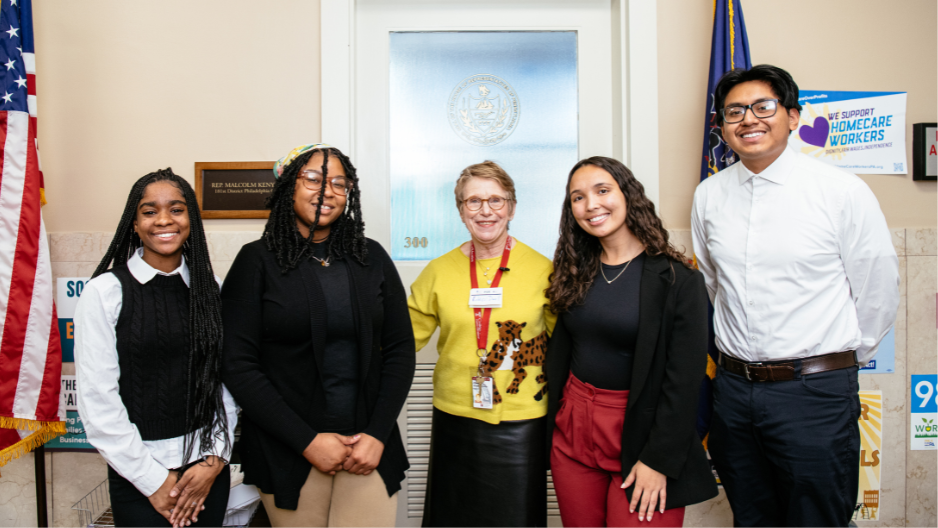For Eileen Dwell, Advocacy Day wasn’t just a professional obligation, it was personal. A proud Philadelphian, Temple alumna and retired educator, Dwell has truly seen education from every angle.
“I’m a product of Philadelphia’s public schools,” she said. “I taught, I was a special education supervisor, I was a principal, and now I’m helping the next generation.”
Even after retiring from her decades-long career in education, Dwell remains deeply involved through her work with Temple University’s College of Education and Human Development (CEHD). She now serves as a coach for student teachers through the CEHD’s Office of Field Placement, guiding future educators as they work toward certification and success in the classroom.
While Dwell has participated in advocacy efforts for various nonprofit organizations, this year marked her first time representing Temple University at Advocacy Day at the State Capitol in Harrisburg.
“This was my fourth time in Harrisburg for advocacy,” she said. “But it was the first time I did it representing Temple. And it was such a powerful and rewarding experience.”
Advocacy Day is an annual event that brings together students, faculty, staff and education professionals to meet directly with legislators to speak on issues that affect Pennsylvania’s education system. This year’s focus was the urgent need to fully fund student teaching stipends.
Dwell is passionate about the cause. “We’re asking these young people to take on what is basically a full-time unpaid job,” she said. “They have to pay tuition, buy books, handle transportation and spend 40 hours a week in schools. There’s no compensation? That’s not right.”
Her belief in the issue goes beyond numbers and policy. Dwell recalled one of the student teachers she coached who received a stipend. “She was able to focus entirely on her student teaching because she didn’t have to work a second job,” Dwell said. “That made a huge difference in the quality of her experience. And the mentor teacher also got a stipend, which made her feel appreciated too.”
The team Dwell joined was organized by Juliet Curci, assistant dean of college access and persistence and director of the Center for Reimagining Excellence, Access and Transformation in Education. Once in Harrisburg, the group split into smaller teams to meet with legislators. Dwell was paired with a nonprofit representative and several students.
“We kind of played off each other’s points during the meetings,” she explained. “I would start with an overview of why we were there, then the students would share their personal stories, and our nonprofit partner would tie everything together with a broader perspective.” She described the teamwork as fluid and natural, with each speaker building on the last.
What stood out most to Dwell wasn’t just what she shared, but what she heard. “The students were so articulate,” she said. “They talked about why they wanted to be teachers and how they were inspired by the good educators they encountered. But not all of them were sure about staying in the field, and that’s something we must pay attention to.”
Some students spoke about the impact of teacher shortages they’d witnessed firsthand, such as having long-term substitutes instead of consistent instruction. “That was painful to hear,” Dwell admitted. “That’s not what students deserve.”
Another eye-opening moment came when a legislator admitted they didn’t fully understand how intensive student teaching really is. “They didn’t know student teachers actually take over classrooms,” she said. “They thought it was just observation, but it’s hands-on. Student teachers plan lessons, manage classrooms and make real-time decisions with support from their mentor teachers.”
Dwell said it felt good to help fill those gaps in understanding. The legislators, she added, were receptive and appreciative. “They thanked us and said they didn’t have all the information before,” she explained. “Some even shared memories of teachers who made the biggest impact on them. That’s how you know this matters, when people can name the educators who changed their lives.”
She believes that fully funding stipends for student teachers can be transformative for the field. “It helps with teacher shortages. It helps with retention. It helps with equity,” she said. “We can’t keep asking people to go into a lower-paid profession, take on debt and do it all without support.”
Without a clear, funded path to the classroom, Dwell fears many talented future teachers will turn away from the profession. Her advocacy comes from a deeply personal place, rooted in decades of experience witnessing both the challenges and rewards of education.
“I don’t have to do this anymore,” she said with a laugh. “But I still do because I believe in it. Coaching and mentoring student teachers makes me feel like I’m still making an impact. And as I tell them all the time, I’m getting older, someone’s got to keep it going.”
Looking ahead, Dwell hopes stipends become the norm, not the exception. “Just like doctors get paid for their residencies, teachers should get paid for student teaching,” she said. “We’re shaping the future. Why are we treating it like it’s optional?”
She also envisions more outreach to high school students and expanded support for future teacher programs. “There are clubs and partnerships out there,” she said. “We need to encourage the next wave of educators early. Get them excited, get them involved, let them know their voices matter.”
When asked what advocacy meant to her, Dwell paused thoughtfully. “It means expressing what’s important, what we value,” she said. “It means speaking out even when you’re not sure who’s listening, because someone always is.”
For Dwell, Advocacy Day is not a moment. It’s part of a movement she’s been engaged with for decades, and one she plans to keep pushing forward for as long as she can.

